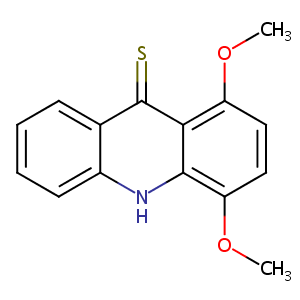| Drug General Information |
| Drug ID |
D0VD8B
|
| Former ID |
DIB019098
|
| Drug Name |
NSC-625987
|
| Synonyms |
NSC 625987
|
| Drug Type |
Small molecular drug
|
| Structure |

|
Download
2D MOL
|
| Formula |
C15H13NO2S
|
| InChI |
InChI=1S/C15H13NO2S/c1-17-11-7-8-12(18-2)14-13(11)15(19)9-5-3-4-6-10(9)16-14/h3-8H,1-2H3,(H,16,19)
|
| InChIKey |
KFAKESMKRPNZTM-UHFFFAOYSA-N
|
| PubChem Compound ID |
|
| PubChem Substance ID |
228330, 492765, 4518451, 10037313, 11114279, 11412614, 14750566, 24724558, 26758444, 34668903, 47572930, 80045826, 85788686, 91746524, 99302674, 111614182, 123080305, 125541701, 135235549, 135685136, 135697658, 140294231, 142986298, 162023337, 162248081, 163123763, 163322669, 163688392, 175607467, 178102574, 179236067, 216088084, 228144850, 246189951, 246948954, 252156317, 252159987
|
| Target and Pathway |
| References |